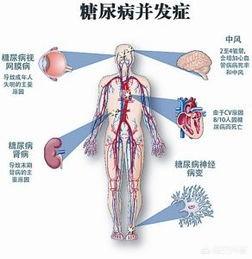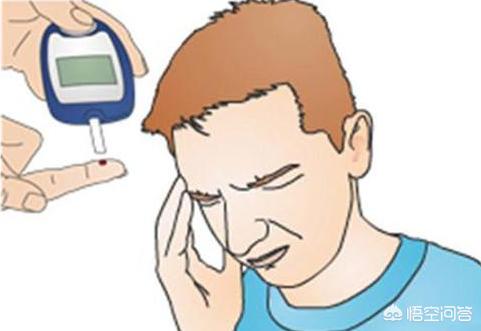What's the deal with excessive sweating in diabetics?
Thanks for the invite.
Diabetes is a very common disease in our life, is a metabolic disease manifested by persistent hyperglycemia, with the further development of the disease, the later can lead to a series of organ and tissue complications. And this, many diabetic patients will also appear to sweat more, this is how it is?
Diabetic patients in the long-term development of the disease, due to persistent elevation of blood glucose did not reach the formal diagnosis and treatment, will cause our plant neuropathy, and the plant nerves have the function of regulating the secretion of sweat, which makes our nervous system is different from the normal regulation of sweat secretion, which can lead to the occurrence of excessive sweating.
Of course, with the further development of the diabetic patient's condition, the later nerve damage aggravated, our body secretion of sweat on the contrary will be reduced, or even the absence of sweat. Of course, the causes of excessive sweating are diverse, and diabetic patients need to be analyzed comprehensively. Long-term uncontrolled diabetes will not only damage the nervous system, but also target organs such as kidneys, blood vessels and eyes.
We have to pay attention to diabetes, regular treatment is very important, we should pay attention to reasonable diet, appropriate exercise, regular medication, and pay attention to monitoring changes in blood glucose levels and regular review. For patients whose oral medication is not effective or whose blood glucose is too high, insulin replacement therapy can also be used if necessary.
Thanks for reading and good health to all. Follow the author for more health knowledge. If you have any questions, welcome to leave a message at the end of the article to discuss. Copyright © All rights reserved, reprinted must indicate the source.
Diabetes mellitus is mainly manifested as high blood sugar, which, if not treated regularly, can lead to acute and chronic damage and dysfunction of various tissues, especially eyes, kidneys, heart, blood vessels and nerves. We need to pay attention to the complications of diabetes, and regular treatment can improve the quality of life of diabetic patients.
What is diabetes?
Diabetes mellitus is a group of metabolic syndromes that are caused by a combination of genetic and environmental factors with hyperglycemia as the main manifestation. Its common types include type 1 diabetes mellitus and type 2 diabetes mellitus. Diagnostic criteria for diabetes are: ① typical diabetes symptoms plus fasting blood glucose ≥ 7.0 mmol / L or two hours after meals ≥ 11.1 mmol / L or random blood glucose ≥ 11.1 mmol / L can be diagnosed; ② no typical symptoms need to be met at the same time to meet the fasting blood glucose ≥ 7.0 mmol / L and two hours after meals blood glucose ≥ 11.1 mmol / L in order to reach the diagnostic criteria; ③ For suspected diabetic patients, glucose tolerance test can be performed to confirm the diagnosis (blood glucose ≥11.1mmol/L can be diagnosed after 2 hours of oral intake of 75g of glucose with water). Any one of the above criteria can be met.(A detailed diagnosis can be found in my earlier post "Is a 3-hour postprandial blood sugar of 9.5 diabetic?" (article)

Causes of excessive sweating in diabetics?
Diabetic complications are varied and include acute complications (diabetic ketoacidosis, diabetic hyperosmolar coma, etc.) and chronic complications (vasculopathy, neuropathy, nephropathy, etc.).
Excessive sweating in diabetics is often caused by diabetes-induced vegetative nerve dysfunction.Diabetes mellitus, due to a chronic failure to control blood glucose well, often causes autonomic disorders (also known as(Plant nerve dysfunction). Human sweating is our own will can not control, in general, when we are strenuous exercise and other situations caused by the rise in body temperature, our autonomic nervous system will regulate the body sweat glands, so that we sweat old lower body temperature. But diabetic patients (especially long-term for the formal treatment, blood sugar control is not good patients) due to long-term high blood sugar, interfere with the normal activities of our body, causing hypoxia, abnormal function of the vegetative nerve, can not feel the body temperature and regulate the secretion of sweat normally.
Patients with diabetic autonomic disorders can present with both excessive sweating and decreased sweat production.Sweating symptoms include hyperhidrosis, oligohidrosis, restrictive hyperhidrosis, gustatory hyperhidrosis (i.e., sweating profusely within a few minutes after eating, also called ingestive sweating) and other sweating abnormalities. Many patients often do not have a high body temperature when sweating, and some patients even experience sweating at night, mistakenly thinking that hypoglycemia occurs, while the blood glucose is normal, which is a need to be vigilant about neuropathy.As autonomic nerve damage worsens, about two-thirds of patients eventually develop sweating disorders, for example, some diabetic patients who used to have "sweaty feet" but slowly developedReduced sweat in the feet or in the lower half of the body, this is what we need to be alert to the occurrence of neuropathy, and need to consult a doctor in a timely manner.

summarize
Diabetes is preventable and controllable, and we must pay enough attention to positive lifestyle changes and early intervention to minimize complications.Patients with diabetes mellitus (especially those who have been on regular treatment for a long time and have poor glycemic control) should be alert for autonomic neuropathy when they experience increased or decreased sweating.But perhaps note that in hypoglycemia patients can also show symptoms of sweating, which we can distinguish by measuring blood sugar.

Share your health knowledge and improve your quality of life, start now. This article is written by away from the original writing of the doctor, the pictures in the article are from the network, due to the author's knowledge limitations, the writing inevitably exists to be debated, please do not hesitate to give advice, and make progress together. If you think this article has a certain reference, also welcome to praise, comment, reply.
WKZNN:
Sweat glands secrete sweat mainly by the autonomic nervous system, when the ambient temperature rises, the human body will increase sweating to take away the heat, in order to avoid the body temperature abnormally high, this is the normal human body to the surrounding environment of a kind of adaptive regulation. However, some diabetic patients are particularly sweaty, even if the weather is not hot, often sweaty; some patients sweating parts of the anomaly, such as sweating is mainly concentrated in the head and trunk, while the limbs do not sweat. The above situation should be highly suspicious of whether the combination of autonomic neuropathy, other relatively rare causes of diabetes mellitus combined with hyperthyroidism, tuberculosis, hypoglycemia and so on.
Diabetic autonomic neuropathy is mainly related to glucose metabolism disorder, oxidative stress, microangiopathy and other factors. At present, there is a lack of effective treatment for diabetic autonomic neuropathy, and comprehensive treatment is the mainstay. Strict control of blood glucose is the basis for the prevention and treatment of diabetic autonomic neuropathy, in addition to the use of some nutritive nerve, improve microcirculation, anti-oxidative stress, anticoagulant drugs, but also with Chinese medicine.
Diabetics can experience a wide range of discomforts; excessive urination and drinking, dry mouth and food, and weight loss are just some of the more typical symptoms of diabetes, and some patients may have no symptoms at all.
But there will still be diabetics in the clinic asking.
Dr. Sun, what's with the sweating?
Dr. Sun, often half of my body sweats and half of my body doesn't, what's wrong?
In response to this, let me tell you about a few of the conditions in which diabetic sweating is common.

First, diabetic sweating, the first thing to consider the acute situation, such as hypoglycemia appeared, due to the sympathetic nerve stimulation, the patient will appear a lot of sweating, accompanied by panic, hunger, etc., this time to measure the blood glucose, the patient's blood glucose may be less than 3.9mmol / L, or blood glucose drop too quickly appeared in the response to eat sugary foods or push glucose solution after the symptom will be relieved very quickly.
Second, the more critical cases of acute ischemia of the myocardium, such as angina pectoris, acute infarction and so on will appear sweating, acute heart failure will also sweat, need to go to the hospital as soon as possible for electrocardiogram, ultrasound, cardiac CT or coronary artery angiography examination, heart failure indicators of the examination.

Third, diabetic abnormal sweating manifested as half of the body, mostly due to long-term blood glucose control is not ideal due to neuropathy, the sympathetic nerves innervating the sweat glands are damaged sweat gland secretion abnormal, there will be sweating, may be the left and right half of the body sweating, may be the upper and lower half of the body sweating, or localized sweating.
In this case, the symptoms will improve after stabilizing the blood sugar and nourishing the nerves.
To summarize: diabetic patients with excessive sweating, it is recommended to rule out the relevant causes against the above scenarios, and to maintain stable blood sugar is the most fundamental treatment to reduce the above possibilities.
I am Dr. Sun, pay attention to Dr. Sun talk about sugar, continue to learn about quality health knowledge, help please like, have questions please leave a message, will reply!
It's because of diabetes.

One is that diabetes results in restricted insulin secretion and increased glucagon secretion, which stimulates the sympathetic nerves. Sympathetic nerve excitation causes panic and increased blood flow, causing sweat glands to secrete sweat.
Similarly due to restricted insulin secretion, after a long period of diabetes, due to medication, it can lead to impaired renal function, commonly known as kidney deficiency, and profuse sweating in the patient.
Since the glands of the entire body are linked, one bad place suffers everywhere, and also often the parasympathetic nerves are stimulated by the activity of other damaged glands, causing localized profuse sweating.
The sympathetic nervous system is the vegetative nervous system in the body. Autonomic neuropathy due to diabetes is currently, at least by Western medicine, completely helpless.
Chinese medicine is a mixed bag of treatments, but the effects vary from person to person, working wonders for some and doing nothing for others, and there are many charlatans.
Moreover, diabetic patients can not get away from the drugs, but as long as the drugs have been used, the kidneys are bound to be damaged, it is almost difficult to recover, and it will become more and more serious, which is a vicious circle.

With the current level of medicine, it is impossible to effectively deal with the various complications of diabetes. If you want to cure it, you can really only take your chances.
At one time my mother-in-law was also a diabetic, a decades old diabetic. She sweated for two general reasonsOne is low blood sugar.You can put some cookies and snacks on hand and eat a few when your blood sugar is low.

The other is that the body is too weakThe answer to this question is no. My mother-in-law is a diabetic with allergic asthma, and she has been on medication and insulin for many years, with very strict dietary control. At the late stage of diabetes, there will be some complications, she is allergic, many drugs can not be used, the treatment process is more suffering, the body is weak, and then often sweat, sweat a lot, sweat wet clothes and hair.
Sweat is also a kind of body fluid, too much loss of fluid, the vital energy will be damaged, you can take some nourishing yin and qi Chinese medicine, such as Sijunzi Tang and so on. But it is still recommended that you go to the hospital to see a doctor, so that the doctor can diagnose, to see whether it is a deficiency of qi, or due to lesions.Excessive sweating can also occur because of lesions such as the following:
1. Hyperthyroidism:Symptoms are usually the ability to eat and drink and sweat, getting thinner and thinner, irritability, and hand tremors.
2. Stroke:Sweating of the head and face, or half sweating and half less sweating, and severe headache, vomiting, etc.
3. Tuberculosis:I woke up early in the morning to find that I was sweating all over my body, but I didn't notice it.

Diabetes mellitus modern medicine clear cause is because of abnormal pancreatic function, refers to the body's absorption and utilization of sugar disorder, Chinese medicine is considered to be thirst, the typical symptoms are three more and one less, to the San Jiao dialectics combined with the internal organs dialectics and divided into upper, middle and lower three types of symptoms, you said sweating, according to the symptom should be the weakness of the spleen qi, but then we have to look at whether it is a night sweating or self-sweating, in order to distinguish between the specific how to administer treatment.
This question and answer are from the site users, does not represent the position of the site, such as infringement, please contact the administrator to delete.